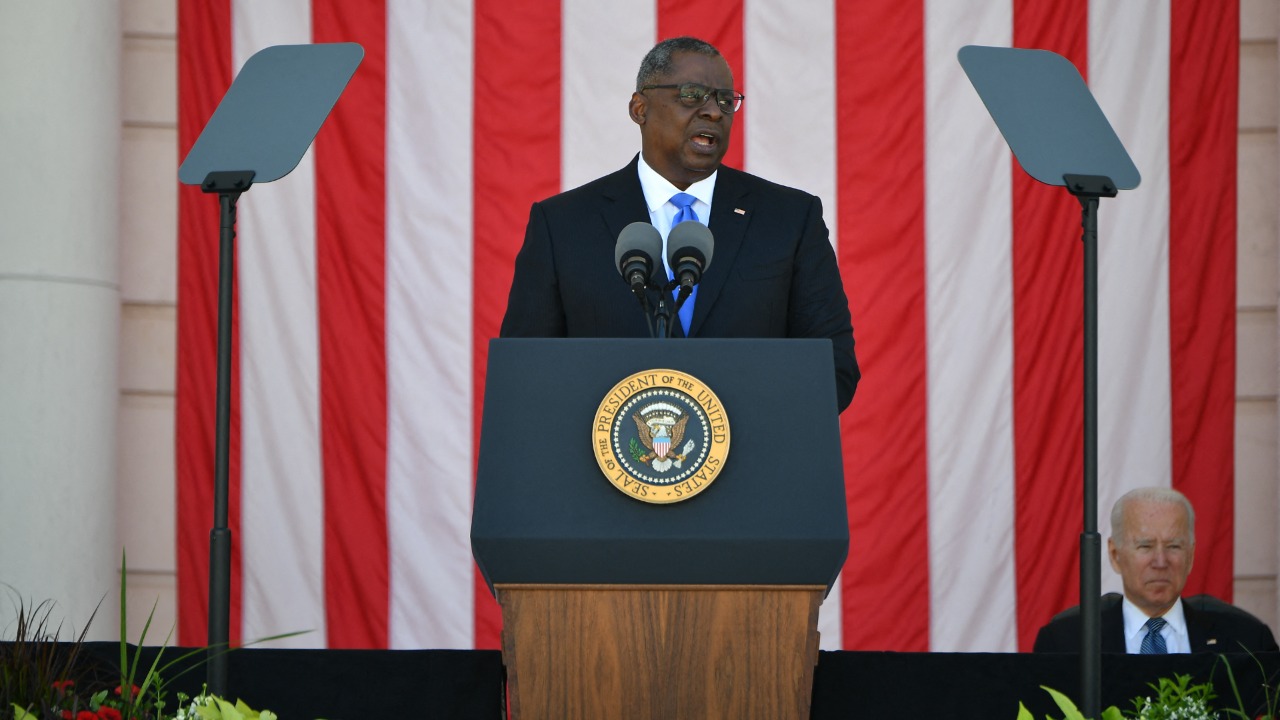US Sec Def: ‘We will defend ourselves and our partners’ against ‘threats from Iran or its proxies’
“We remain deeply committed to preventing Iran from gaining nuclear weapons,” and “no problem in the Middle East gets easier to solve with a nuclear armed Iran.”

WASHINGTON DC (Kurdistan 24) – Speaking to journalists on Wednesday, US Secretary of Defense Lloyd Austin affirmed Washington’s ongoing commitment to countering threats from Iran.
Austin began by explaining that later this week, he would be visiting Bahrain, where he will address the Manama Dialogue, a security forum held annually in the Gulf shaykhdom. He will also visit the United Arab Emirates (UAE.)
“It’s not lost on me that this trip comes at a time when Iran is stoking tensions and undermining stability in the region,” he added.
“We remain deeply committed to preventing Iran from gaining nuclear weapons,” and “no problem in the Middle East gets easier to solve with a nuclear armed Iran,” Austin continued.
“Of course, Iran presents serious security challenges that extend beyond that program,” he noted. “So I’m going to continue to be very clear. We will defend ourselves and our partners and our interests against threats from Iran or its proxies.”
Blocking an Iranian Nuclear Weapon?
“We fully support the president’s efforts to achieve a new diplomatic agreement with Iran over its nuclear program,” Austin affirmed. Yet questions have arisen about the efficacy of those efforts.
The Biden administration has sought to restore the 2015 nuclear deal, known as the Joint Comprehensive Plan of Action (JCPOA), which former President Donald Trump left in 2018.
Six rounds of talks were held between Iran and the P5 + 1 (Britain, China, France, Germany, Russia, and the US), although the US was not in the same room and participated indirectly—as the other countries conveyed the positions of Iran and the US to each other in what was an awkward and time-consuming arrangement.
However, those talks ended in June, after the hardline cleric Ebrahim Raisi won the Iranian elections. Those discussions are slated to resume on Nov. 29.
In the meanwhile, Iran has steadily increased its violations of the JCPOA. On Wednesday, the International Atomic Energy Agency (IAEA), which is charged with monitoring Iran’s nuclear program, issued a new report that provided more details about Iran’s actions.
The IAEA said that, as of Nov. 6, it estimated Iran’s stockpile of highly enriched uranium at nearly 4,500 pounds, “several times more than the cap” stipulated in the JCPOA, Al Jazeera reported.
Iran’s stockpile of 20 percent enriched uranium rose from 186 pounds in September to 251 pounds, while its stockpile of 60 percent enriched uranium nearly doubled—39 pounds, up from 22 pounds.
In addition, since February, Iran has increasingly restricted the capabilities of the IAEA inspectors. They have been denied access to video footage of its nuclear sites, online enrichment monitors, and electronic seals.
That is why the IAEA is now providing estimates of Iranian nuclear enrichment, rather than precise figures.
Last Friday, the head of the IAEA, Rafael Grossi, complained publicly about his lack of contact with the new Iranian government. It responded by inviting him to Tehran, which he will visit on Nov. 22, a week before the next round of negotiations begins.
Israel, Gulf Arab Concerns
Key US allies—Israeli, Saudi Arabia, and the smaller Gulf states—are all very concerned about Iran’s nuclear program, as well as its use of proxy forces to expand its influence in the region.
Last week, naval exercises were held among Israel, Bahrain, the UAE, and the US, which acted as the coordinator of the activity.
The exercises took place in the Red Sea—far from Bahrain and the UAE—rather than the Persian Gulf, quite possibly to minimize any possible difficulties with Iran.
US Naval Forces Central Command stated that the exercises were intended to “enhance interoperability between participating forces’ maritime interdiction teams.”
The exercises marked the first such military maneuvers between Israel and the Gulf Arabs. They were facilitated by the Abraham Accords—normalization agreements reached in the latter half of 2020 between Israel and a number of Arab states, including Bahrain and the UAE.
Although Austin apparently will not be visiting Israel on this trip, he did speak with Israel’s Defense Minister earlier this month.
According to a Pentagon read-out of their Nov. 2 conversation, Austin “reinforced his commitment to the US-Israel strategic partnership and to our close cooperation to counter security threats and address challenges in the region.”